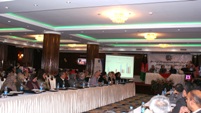 Kabul, 8 December, 2013 – The Ministry of Public Health and its UN partners on 8December 2013 announced the introduction of two action plans to further reduce maternal, neonatal and child deaths in the country.
Kabul, 8 December, 2013 – The Ministry of Public Health and its UN partners on 8December 2013 announced the introduction of two action plans to further reduce maternal, neonatal and child deaths in the country.
While great progress has been made in recent years, maternal and child mortality rates in Afghanistan remains among the highest in the world. According to the recent Afghanistan Mortality Survey, out of every 1000 live births, 97 children die before their fifth birthday and 327 women die per 100 000 live births as a result of complications during pregnancy and childbirth.
The Reproductive, Maternal, Neonatal and Child Health plan and the Every Newborn Action Plan were developed by the Reproductive and Child Health Departments of the Ministry of Public Health and its partners. The plans aim to achieve a 10% increase in access to essential reproductive, maternal, newborn and child health services by people living in the country’s most underserved and underprivileged areas. They will provide a framework to support the implementation of national programmes for a basic package of health services and an essential package of hospital services, strengthening coordination, leveraging and aligning resources and improving maternal and child health services.
Dr Suraya Dalil, the Minister of Public Health, said that, “The Ministry of Public Health has in the past few months embarked on an intensive planning process which has brought together key UN agencies and concerned partners at country level, resulting in the development of these plans”. "Significant new resources are needed to scale up known effective interventions if we want to reduce preventable maternal and child death. I am calling on all partners to align their resources and to support these plans, to make the attainment of MDGs 4 and 5 a reality in Afghanistan," she added.
The event was also attended by Ms Karin Hulshof, Regional Director of UNICEF for South Asia, Dr Rik Peeperkorn, WHO Afghanistan Representative, Wilfred Ochan, UNFPA Afghanistan Deputy Representative and representatives of development partners and donors.








